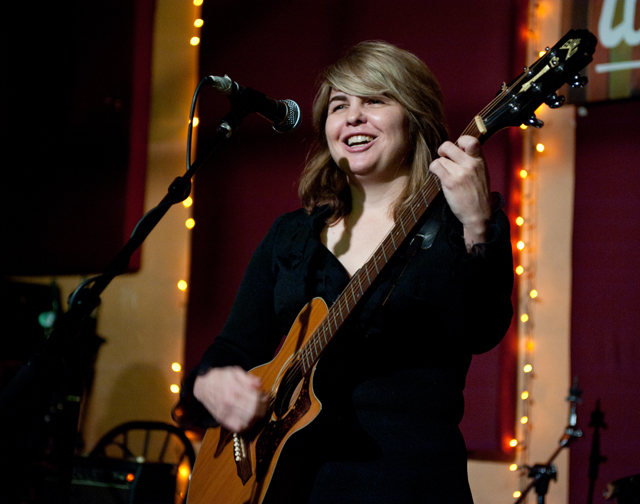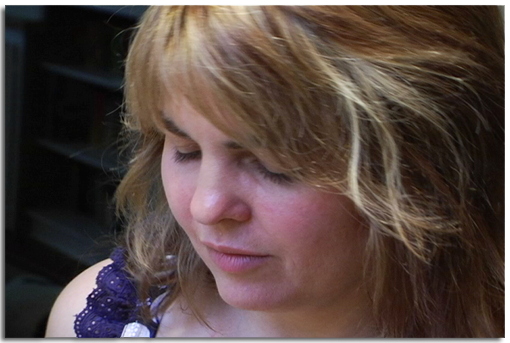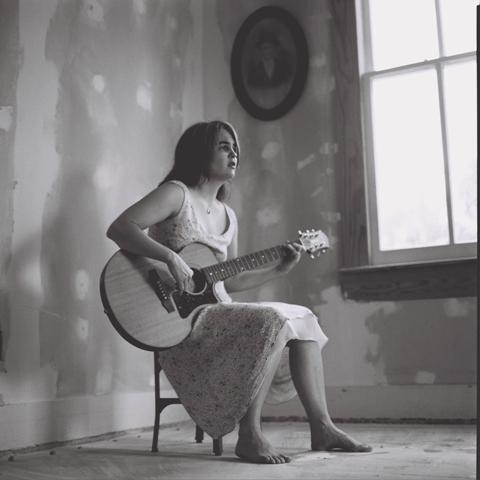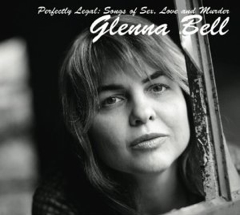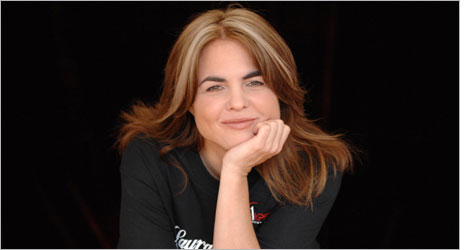Glenna Bell at the Living Room in New York City:‘What I wanted was that this album would be the tipping point. I want to go to that next level where I can be part of things and play on the circuit. Just do more…’A ‘Perfectly Legal’ Mission
Glenna Bell is looking for a breakthrough with her fourth album, and some respect for the cultural legacy of her east Texas stomping grounds
By David McGee
It’s Sunday night in New York City, early December, and between the usual holiday festivities and the general pre-workweek malaise that tend to sap the populace’s energy, it’s not the best evening to be making your Gotham debut. But on Ludlow Street on the Lower East Side, the Living Room, one of the city’s finest singer-songwriter showcase venues, the room is about half full. If it’s Monday through Saturday, it’s half empty; but on Sunday night, it’s half full. That’s pretty good for an impressive singer-songwriter with a country bent whose fourth album, the provocatively titled Perfectly Legal: Songs of Sex, Love and Murder, is newly released, but who is virtually unknown in these parts. Her band is not a touring band, but rather a trio (guitar/dobro, bass and drums) assembled by bassist Jeff Eyerich—who is well known and well respected in these parts for his various associations with interesting bands such as Dave’s True Story—and some the folks on hand are doubtless of the FOB (Friends Of the Band) variety. Still, there have to be others drawn here by having heard Glenna Bell’s stark, dramatic tales of the search for love in all its manifestations, and now want to see the artist who created such a striking body of work.
A native of the Big Thicket region of southeast Texas—she grew up in Lumberton and Pineland—holder of a Master’s Degree from Texas A&M University and now a long-time resident of Houston, Bell’s smooth set reflects both her affection for her home state and her advanced education: from the stage she speaks often of Texas, either as it relates to a specific story she’s about to tell in song or as it figures into her own life’s journey—sometimes the two are intertwined—and both her between-songs patter and her lyrics bespeak a writer’s focus on narrative integrity: all the pieces fit and make sense.
Glenna Bell: I was thinking about this when I was trying to put a set list together for the show in New York. I have some songs that I think probably you would never realize that the person who wrote them is from Texas; they’re just standard songs, love songs, whatever. But I’ve noticed that I’ve actually written a variety of songs that seem specifically Texan. In New York I was thinking the people in the audience might not know that much about Texas, and I like to bring a piece of home with me wherever I go. So ‘Shiner Bock & ZZ Top,’ for instance, a song from my last album, Road Less Traveled, is a picture of Houston, or how Houston used to be, before the town homes and Starbucks moved in. I have another one on the last album, ‘The Texas Aggies Win Again.’ I did that one in the show a cappella. That’s a real picture of Texas. Texas A&M down here is just the bastion of old Texas. My father was the president of his class there years ago, before they admitted women. As far as this new album, I would imagine if someone sat down and listened and had to take a guess, they’d probably say ‘Texas,’ because I think it does come through in the vocals. I’ve lived in Houston for quite awhile now, and I’ve lived in L.A. I guess I had fashioned myself as rather cosmopolitan, but then when I heard the album, I thought, Oh, no! I thought I lost my brogue a long time ago.Onstage she evinces the charming, unself-conscious seductive quality of a woman whose down-home manner isn’t a pose she’s affected as a show-biz gimmick but rather is simply who she is. Dressed in a demure knee-length black dress (basic black—she may live in Houston but she’s outfitted for the Lower East Side) sporting fringe at its hem and lace on its sleeves, shod in black cowboy boots, her legs covered by patterned stockings, her thick mane of blonde-brunette hair failing about her shoulders, Ms. Bell looks as much at home as she sounds. She and the band kick off the set with the first song on the new album, a cover of the classic “Frankie and Johnny,” thumping, bouncy, even cheery, in stark contrast to its story, which happens to contain all the themes of the new album—love, sex and murder. Cover songs are not necessarily Ms. Bell’s thing, but there are three among the eight tunes on Perfectly Legal: in addition to “Frankie and Johnny,” she does a powerful a cappella rendition of a latter-era Sam Cooke gospel tune (from 1963) penned by the great J.W. Alexander, “Lost and Lookin’,” and turns in a poignant duet with producer John Evans on the forgotten classic that is DeWayne Blackwell’s pleading country love ballad “Honky Tonk Man,” better known as the Merle Haggard-performed theme song for the like-titled Clint Eastwood film, its gentle shuffle and crying steel providing a soothing contrast to the duet partners’ fervent vocal embrace. (Kevin "Big Kev" Ploghoft, Ms. Bell’s long-time friend and producer, is not AWOL on this outing: was behind the board for one track of Perfectly Legal, a harrowing original murder ballad, “The Southern Gothic Wedding Waltz,” and as Ms. Bell's confidante was integral to the project's conceptual conceit.)
Glenna Bell: I’ve never really recorded many cover songs. Most of my albums are pretty much all originals, with one cover song thrown in every now and then. But Big Kev started sending me some different songs, mp3s, you know. He thought it would be good to do some cover songs for this one. I didn’t connect with a bunch of them, but the ones I did I thought, Yeah, that feels right. ‘Lost and Lookin’,’ I had never heard that one before, but I found out that Sam Cooke recorded it in 1963. I really loved it. It’s Sam and an upright bass on the original recording. I really love minimalism. I come from a background, I grew up in the woods of the golden triangle that is east Texas, very close to Louisiana, and when I was a child, we lived in the country and went to a little church there in the woods and it was all a cappella singing. I’ve always had a place in my heart for that kind of singing. I’ve never recorded an a cappella song, though. So I thought, I’m gonna take it one step further than Sam Cooke and just do the song a cappella. I thought it would work since it worked well for him with just the upright bass. I didn’t know about ‘Honky Tonk Man’ either. Big Kev sent me that song, and he sent me Merle Haggard’s version of it. I love that. Big Kev’s idea was to make it a duet. So he wrote a first draft, converted it to a duet, and I used my theater background—I used to do some playwriting—and worked on it a little more. That was one of the ones we did in Austin with John Evans. He and I have a history of duets—on my last two albums he and I sang some duets.
More about that “I used to do some playwriting” later. Note, now, how Texas pops up in the preceding answer. She is especially vocal in trumpeting the lasting musical legacy of her own Big Thicket area of the Lone Star State, which includes a city boasting a legendary portfolio, as Ms. Bell is quick to point out in explaining some of what drives her: “It’s such an important part of our history—Janis and George Jones came out of there, even Rauschenberg, you know, from Port Arthur. Kind of amazing when you think about it from a cultural or sociological perspective, because it’s such a small niche, yet so much great talent has come out of there. Lately I’ve been telling people that Austin has hijacked Texas music. Texas music is so diverse. I think the stuff that came out of east Texas is different than what came out of the hill country or even the west. So my mission is to try to bring more attention to the east Texas culture and art.”
Glenna Bell at home in Houston: ‘I think the stuff that came out of east Texas is different than what came out of the hill country or even the west. So my mission is to try to bring more attention to the east Texas culture and art.’She might also have mentioned her own family legacy in the Lone Star State: her ancestors have been traced to the early days of the Republic and Texas’ battle for independence. In Pineland and Lumberton she rode in rodeos and lived the real country life before matriculating to Texas A&M.
From the Living Room stage, and in the ones and zeros on the CD of Perfectly Legal, is another Big Thicket story that has nothing to do with Janis, George, Robert or anyone else down there except Glenna Bell and her family, specifically her and her father. In her trembling voice is the sound of a tear ready to drop, or a fear about to be realized, of the certainty of an uncertain future. You hear it in the darkness permeating her fatalistic foreboding in “These Days” and in the song’s eerie atmosphere, all the more striking at the Living Room when the singer is framed solely by a chiming dobro and rumbling bass. She introduces “The Texas Aggies Win Again” by noting how her father “never came to see me onstage,” and speaks of him as being a distant figure in her young life. Although “Poor Girl,” from her 2005 debut, Face This World, is a full-on sprint, seemingly joyous, one lyric in particular stands apart from the others: “Do you love me?/ I want to think so/but I’ve heard those hurtful words before.” Even “Hurricane,” a song from the new album about falling in love, inspired by the fury of Hurricane Ike, which hit Houston in 2008, offers a telling lyric in “You gave me fair warning/but I thought I was strong.” All roads, it seems, lead back to a conflicted relationship with the artist’s father, and in concert her plaintive query of “Do you love me?” hangs in the air throughout the performance, unanswered and haunting. Listening to the new songs on disc and hearing them live, someone familiar with Ms. Bell’s history can’t help wondering if in her songwriting she continues to reach out to her father.
Glenna Bell: That’s interesting from a psychoanalytic point of view. But the fact is I think so. I hadn’t really thought of it that way, but that’s very perceptive. You’re thinking of a line in that song ‘The Texas Aggies Win Again,’ where I sing ‘and you never even came out to see me onstage.’ Yeah, that’s true. That’s another part of our culture. The older generations down here are not into the music like that—in other words, people of that generation, not all of them but a lot of them, tend to see music as something that’s done in places nobody should be going. Especially young ladies. You know, bars, basically, and that sort of thing.
It’s interesting. I read this biography of Janis Joplin, and the first chapter is all about Port Arthur. It was all about the era my mother grew up in, the ‘50s, because Janis would be about the age of my mother. It really enlightened me when I was asking, ‘Why don’t my parents want to support me in my music? Why don’t they have any interest in something that means so much to me?’ When I was a little girl and we started to go to church, I was about six or seven, I just loved the singing so much, the a cappella singing, and I would sing all the time. I would listen to all the records my parents had, mainly country but also Broadway musicals—mom loved the musicals—and dad loved country music, Johnny Cash and all that. I mainly tended toward the country music, and I would sing along with everybody who came on the radio and play records all day long when I was young. I would sing when I was alone or sing in the back of the car on family trips, always trying to sing just like Dolly, or just like Loretta, or just like George Jones, it didn’t matter. So the writer of this biography was saying that that was a very typical mindset in that time and place and that parents were scared to death, including Janis’s parents, that their child might fall onto that wayward path. The long-winded answer to your question is yeah, that’s always been an ongoing, haunting theme that echoes through my work, and I bet you’re right that it is a subconscious way of reaching out to wanting your parents to embrace you and that which you love.
Glenna Bell, ‘Hoping I Could Be Wrong,’ from her 2005 album, Face This WorldShe attended Texas A&M because “I was too young to know what to do or where to go, but I knew I had to go to college. Dad said, ‘You’ll go to A&M; that’s where I went.’ So I said okay. Then when I got there I realized it’s a very technical school, not many artistic people go there, at least not back in the ‘80s. I really lucked out because I had very little in common with most Aggies, but I was lucky enough to get this roommate from North Dakota and she had a Martin guitar, a 1967 Martin or something, it was beautiful. She had learned to play in the Carter style from a guy up in North Dakota, an older guy, and taught me in the dorm. That was perfect because it was a marriage of my love of singing and writing poetry—when I was in high school, like a lot of high school girls, I wanted to write poems, usually love poems about my broken heart and whatever boy had not wanted me or whatever.”
Apart from her father and “Big Kev,” another man figures prominently in Glenna Bell’s life. His is a familiar and legendary name in the arts—three-time Pulitzer Prize winning playwright Edward Albee, to whom Ms. Bell dedicates Perfectly Legal. Following her undergraduate years, Ms. Bell migrated west, to Venice, CA, where she lived with a boyfriend and tried to figure out what to do with her life. One day she saw an ad in the L.A. Reader. The publication was seeking a theater critic. Feeling she had nothing to lose, and ignoring her beau’s pronounced skepticism (“I can’t believe you’re applying for this. You don’t have any experience. You’ll never get it—this is Los Angeles.”), she applied—and got the job. “Suddenly I was just going to plays every week, and I really liked that. But I had not had any background in theater. I had a degree in English and I was a pretty good writer. But then as I started to go out seeing all of these plays I really loved it.”
Next stop: the University of Houston, where Albee was in residence as a professor of an exclusive Creative Writing program. Ms. Bell's friends were all theater people, and she was still reviewing plays. Encouraged to write a play of her own, she did so, and voila! It was staged. Albee happened to be in the audience one night, and the budding playwright worked up the nerve to introduce herself to him. “He liked my play and said he would accept me into his class. It was kind of hard to get into his class. That’s how that went.”
Three other Glenna Bell albums do not bear a dedication to Edward Albee, though. Perfectly Legal does, and one’s immediate thought might be because of its theatrical structure: it is divided into four acts of eight songs total, each act recorded in a different studio, three in Texas, one in Pennsylvania (the Big Kev session). The cover songs serve as digressions from the main storyline—pipe dreams, you might say—with Ms. Bell’s originals carrying the story forward until it finally breaks into the light at the end, with the spirited, feisty “The Cougar Anthem,” which describes, after so much sorrow and despair preceding it, a woman cutting loose, taking a young lover and celebrating her liberation—one lyric even refers to it as a “freedom song.”
Yet, the conceptual nature of the tunestack wasn’t what inspired the Albee dedication. In fact, the concept, as Ms. Bell explains it, came about quite by accident.
Glenna Bell: The funny thing is, now that I think back over it all, I didn’t set out thinking, I’m gonna record eight songs and they’re gonna fall into these different categories thematically speaking. It just kinda started turning out that way. Big Kev likes a line in “The Cougar Anthem” that says “nineteen years is perfectly legal.” So he said, “Why don’t we call it Perfectly Legal?” I thought it was kinda catchy but didn’t know if it embodies the album. So I thought, Let’s make a subtitle. And these songs seemed to be touching on certain themes, and I guess that just kind of happened somehow.
At some point it just occurred to me that these songs were falling into these thematic categories. The more I think about it, some of them, especially “Hurricane,” fit all three—sex, love and murder. It’s a song really about falling in love. Some critics have said he was a hurricane of a man who destroyed my life, or something like that (laughs) and I didn’t think of it that way. It’s obviously metaphorical. I wrote that song after Hurricane Ike hit Houston. That’s kind of how it all started. I was in Nashville and I was talking to Big Kev, having this debate, and he was saying, oh, that every song has to have a hook. I know that’s true from a commercial perspective, but I don’t know; I think of myself as an artist, and to me if it works, it works. So I was saying, well, you know I like a lot of great songs with hooks, but on the other hand I don’t think a song has to have hooks. I said, “Okay, fine, I’ll just show you. I’ll write a song with a hook as soon as I get home.” So I came home after the hurricane had hit Houston. I was in Nashville and my stay there was delayed because I couldn’t get back to Houston, so when I got here it was just awful to see what the hurricane had done. And that’s when I sat down and wrote that song. But I realized not long ago that it does seem to embody those three themes.
As it happens, it was the inner sleeve photograph of Ms. Bell that inspired the Albee dedication.
“You know, I never had thought of a direct connection until I did this album,” she explains. “But I think Mr. Albee has probably affected me as a person and as an artist in a lot of different ways. I’ll just always value the time I spent with him. I studied with him for three years at U. of H and I consider him perhaps the last truly great American writer. He’s won the Pulitzer three times and he wrote Who’s Afraid of Virginia Woolf? that didn’t win the Pulitzer but it’s a major play. I realized this album was taking on a theatrical bent, more so than the other ones, when I saw the photography. We did she shoot out in the wilds of Pennsylvania, which actually resembles a lot where I grew up in east Texas, believe it or not. When I saw the photos, I think that’s when I began to think of Mr. Albee. I wore a dress I got out of a thrift shop; it’s from the ‘50s. Then the way he did the photos in black and white, and I thought, Oh, Mr. Albee. And also I know Mr. Albee is getting older now and I just wanted to find some way to pay a tribute to him. I think this album in some ways is classic and that’s Mr. Albee all the way—classic. So I just decided it would be nice to dedicate it to him. But one thing he taught me about music that I’ll never forget, even though it was a playwriting class. He used to tell us that plays are a lot like music in various ways. He would often use classical music as a comparison because of the moods, you know. And of course plays unfold that way. But what really stuck with me was, he would always say, ‘Music is a combination of sound and silence.’ I don’t hear enough silence in most of the music that’s coming out today.”
The Living Room show ends on a high note—the aforementioned “freedom song,” aka “The Cougar Anthem,” and in the bouncy, high-spirited unfolding of its moment the artist is fully in thrall of the Cougar spirit—and we’re not talking Houston Cougars here, folks, in case her gleeful articulation of the lyric “he’s 19 and hot!” wasn’t a dead giveaway. A celebratory close to a triumphant night it was.
Glenna Bell: The truth is I hope this album would be the one. I’ve been working at this really hard for about five years now. I really started on this journey in 2004 by recording the album Face This World. Then, once that was done, at the beginning of ’05, I started to take it really seriously and I had a management group, started playing and trying to do everything right. I do a newsletter that I send out once or twice a month to let people know where I am and what I’m doing. I’m trying to pay my dues, playing all kinds of venues and benefits, mainly in Texas right now. I feel like I’ve made progress. It’s a process, you know; everything is in life. I’ve learned about distribution, I’m corresponding with one of the vice presidents at ASCAP and I got an audio portrait recently, which was great. I got a House resolution from the State of Texas honoring my music, I’ve been on live TV, lots of radio shows, played New York. But what I wanted was that this album would be the tipping point. I want to go to that next level where I can be part of things and play on the circuit. Just do more, especially up east. I just love it up there. We don’t have so many listening rooms down here.
Isn’t the Living Room wonderful?
Glenna Bell’s Perfectly Legal: Songs of Sex, Love and Murder is available at www.amazon.com***
Texas House Of Representatives Honors Glenna Bell’s Music
On May 15, 2007, the Texas House of Representatives honored the music of Texas-born singer-songwriter Glenna Bell with the following House Resolution, which was read in a ceremony at the Capitol on the Floor of the House in Austin. House Speaker Tom Craddick was in attendance, and personally congratulated Miss Bell for her musical contributions to the Lone Star State:
H.R. No. 1304
RESOLUTION WHEREAS, A talented singer and songwriter, Beaumont native Glenna Bell is drawing attention for her stark yet beautiful songs that conjure up the heartfelt essence of traditional country music while expressing a fresh, contemporary perspective; andWHEREAS, Ms. Bell has recorded three albums to date, Nobody's Girl, which appeared in 1998, Face This World, from 2006, and The Road Less Traveled, which is scheduled to appear in 2008; each features her haunting songs that present tales of heartache, love, and loss in a stripped down and powerful style; and
WHEREAS, Glenna Bell's music is colored by the sounds that she grew up with in East Texas: a cappella hymns sung in her family's church and old-school country music that she discovered in her relatives' record collections; with the help of veteran Texas musicians such as John Evans, who has produced Ms. Bell's last two albums, and Johnny Bush, who sings on The Road Less Traveled, Glenna Bell has distilled her influences into moving songs that are receiving airplay on country and Americana radio stations across the country; and
WHEREAS, Carrying forward the classic, unembellished style that has graced so much great music from Texas, Glenna Bell has emerged as a musician and storyteller of great promise and stands as an exciting addition to the musical tradition of the Lone Star State; now, therefore, be it
RESOLVED, That the House of Representatives of the 80th Texas Legislature hereby honor Glenna Bell for her musical accomplishments and extend to her best wishes for continued success; and, be it further
RESOLVED, That an official copy of this resolution be prepared for Ms. Bell as an expression of high regard by the Texas House of Representatives.
As Speaker of the House I certify that H.R. No. 1304 was adopted by the House on April 13, 2007, by a non-record vote.
THE BLUEGRASS SPECIAL
Founder/Publisher/Editor: David McGee
Contributing Editors: Billy Altman, Laura Fissinger, Christopher Hill, Derk Richardson
Logo Design: John Mendelsohn (www.johnmendelsohn.com)
Website Design: Kieran McGee (www.kieranmcgee.com)
Staff Photographers: Audrey Harrod (Louisville, KY; www.flickr.com/audreyharrod), Alicia Zappier (New York)
E-mail: [email protected]
Mailing Address: David McGee, 201 W. 85 St.—5B, New York, NY 10024
Founder/Publisher/Editor: David McGee
Contributing Editors: Billy Altman, Laura Fissinger, Christopher Hill, Derk Richardson
Logo Design: John Mendelsohn (www.johnmendelsohn.com)
Website Design: Kieran McGee (www.kieranmcgee.com)
Staff Photographers: Audrey Harrod (Louisville, KY; www.flickr.com/audreyharrod), Alicia Zappier (New York)
E-mail: [email protected]
Mailing Address: David McGee, 201 W. 85 St.—5B, New York, NY 10024


